仁爱版七年级英语知识点(全)
仁爱版七年级英语上册知识点归纳
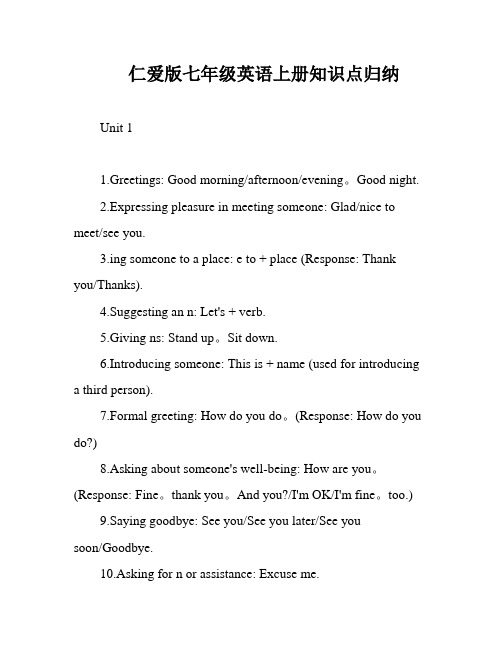
仁爱版七年级英语上册知识点归纳Unit 11.Greetings: Good morning/afternoon/evening。
Good night.2.Expressing pleasure in meeting someone: Glad/nice to meet/see you.3.ing someone to a place: e to + place (Response: Thank you/Thanks).4.Suggesting an n: Let's + verb.5.Giving ns: Stand up。
Sit down.6.Introducing someone: This is + name (used for introducinga third person).7.Formal greeting: How do you do。
(Response: How do you do?)8.Asking about someone's well-being: How are you。
(Response: Fine。
thank you。
And you?/I'm OK/I'm fine。
too.)9.Saying goodbye: See you/See you later/See yousoon/Goodbye.10.Asking for n or assistance: Excuse me.11.Introducing oneself: I'm + name.12.Origin: Be from/Come from.nguage: In English.14.Spelling: Can you spell it。
(Response: Yes/No).15.Responding to thanks: That's OK/That's all right/You'ree/Not at all.16.Age:。
仁爱英语七年级上知识点
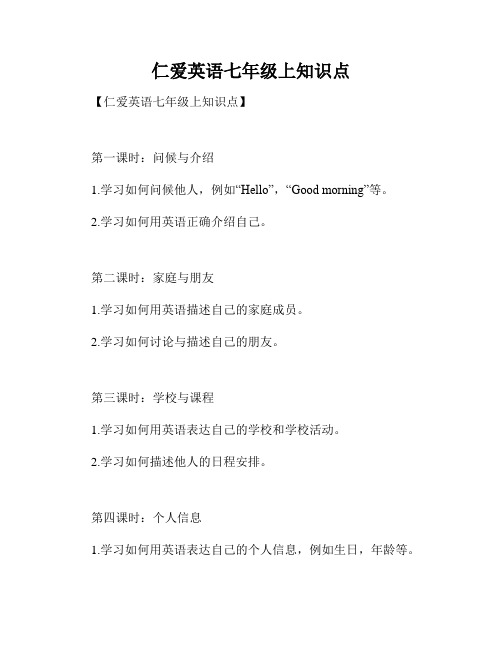
仁爱英语七年级上知识点【仁爱英语七年级上知识点】第一课时:问候与介绍1.学习如何问候他人,例如“Hello”,“Good morning”等。
2.学习如何用英语正确介绍自己。
第二课时:家庭与朋友1.学习如何用英语描述自己的家庭成员。
2.学习如何讨论与描述自己的朋友。
第三课时:学校与课程1.学习如何用英语表达自己的学校和学校活动。
2.学习如何描述他人的日程安排。
第四课时:个人信息1.学习如何用英语表达自己的个人信息,例如生日,年龄等。
2.学习如何讨论并描述他人的个人信息。
第五课时:购物与饮食1.学习如何用英语购买物品,例如面包,牛奶等。
2.学习如何用英语点餐并描述自己喜欢的食物。
第六课时:活动与爱好1.学习如何用英语描述自己的爱好以及自己参与的活动。
2.学习如何讨论他人的爱好以及他们参加的活动。
第七课时:时间与日期1.学习如何用英语表达时间和日期。
2.学习如何预定约会并记录重要日期,例如约会,生日等。
第八课时:天气与季节1.学习如何用英语表达天气和季节。
2.学习如何描述他人的天气和季节体验。
第九课时:交通工具1.学习如何用英语描述常见的交通工具,例如自行车,汽车以及公共交通工具。
2.学习在英语中请求帮助和指示方向。
第十课时:健康与生活方式1.学习如何用英语描述健康和生活方式,例如进行体育锻炼,不吃垃圾食品等。
2.学习如何讨论他人的健康状况和生活方式。
以上就是仁爱英语七年级上的主要知识点,掌握这些知识点将使你更自信地用英语与他人交流。
希望你能够认真学习并用英语学习更多的知识点。
仁爱版七年级英语知识点梳理

仁爱版七年级英语知识点梳理Unit 1 How Do You Study for a Test?Vocabulary•academic (adj.) 学术的•advice (n.) 建议•chart (n.) 图表•classical (adj.) 古典的•experiment (n.) 实验•grade (n.) 年级,分数•method (n.) 方法•musician (n.) 音乐家•suggestion (n.) 建议,提议Useful Phrases•get ready for… 为…做好准备•make flashcards 制作抽认卡• a variety of 各种各样的•in order to 为了•take breaks 休息Grammar1.动词不定式•用于表达目的或意图–They study hard to get good grades.•接副词修饰–She plays the guitar beautifully to impress her friends.2.祈使句•用于表达建议或命令–Take a break and relax.Unit 2 What Is the Greenest Way to Travel? Vocabulary•bicycle (n.) 自行车•electric (adj.) 电动的•environment (n.) 环境•motorbike (n.) 摩托车•pollution (n.) 污染•public transportation 公共交通•recycle (v.) 回收利用•reuse (v.) 重复使用•walk (v.) 步行Useful Phrases• a lot of 很多•be made of 由…制成•in order to… 为了…•take advantage of 利用Grammar1.一般现在时•描述经常性活动或状态–I usually take the bus to school.•描述客观真理–The sun rises in the east.2.非谓语动词•表示相对于主语的动作或状态–I like walking in the park on weekends. Unit 3 Why Do You Like Pandas? Vocabulary•adorable (adj.) 可爱的•bamboo (n.) 竹子•behavior (n.) 行为•extinct (adj.) 灭绝的•habitat (n.) 栖息地•mammal (n.) 哺乳动物•natural (adj.) 自然的•survival (n.) 生存•wildlife (n.) 野生动物Useful Phrases•be famous for 因…而闻名•be used to 习惯于…•in danger 处于危险中•take care of 照顾Grammar1.一般过去时•描述过去的动作或状态–I liked pandas when I was young.•描述客观真理中的过去状态–Dinosaurs were extinct long before humans appeared.2.形容词的比较级和最高级•比较两个或多个物体或人的大小、高低、数量等–Pandas are cuter than koalas.•比较三个或三个以上物体或人的大小、高低、数量等–Elephants are the biggest land animals in the world. Unit 4 Can You Tell Me Where the Bank Is? Vocabulary•bank (n.) 银行•bookstore (n.) 书店•department store 百货商店•post office 邮局•skyscraper (n.) 摩天大楼•subway (n.) 地铁•supermarket (n.) 超市•traffic light 交通信号灯•turn left/right 向左/右转Useful Phrases•be across from 在…的对面•go straight 直走•next to 紧挨着•on the corner of 在…街角的Grammar1.介词短语表示方位•表示物体或人相对位置–The bank is across from the post office.•表示物体或人所在的位置–The supermarket is next to the bookstore.2.方位副词•表示方向或位置–Turn left at the traffic light.Unit 5 Do You Want to Watch a Game Show? Vocabulary•cheer (v.) 欢呼,喝彩•contestant (n.) 参赛者•entertainment (n.) 娱乐•host (n.) 主持人•live (adj.) 直播的•quiz (n.) 测验•reality show 真人秀•sitcom (n.) 情景喜剧•talent show 才艺秀Useful Phrases•have fun 玩得愉快•have a good time 过得愉快•in my opinion 在我看来•be similar to 与…相似Grammar1.情态动词 can 表示能力或请求•表示能力–I can speak Chinese and English.•表示请求–Can you help me with my homework?2.双宾语动词•受词可以是人也可以是物–My parents bought me a new bike for my birthday. Unit 6 I’m More Outgoing Than My Sister. Vocabulary•athletic (adj.) 运动的•creative (adj.) 有创造力的•friendly (adj.) 友好的•funny (adj.) 有趣的•outgoing (adj.) 外向的•quiet (adj.) 安静的•serious (adj.) 严肃的•shy (adj.) 害羞的•talkative (adj.) 多话的Useful Phrases•as…as 和…一样•be interested in… 对…感兴趣•in total 共计•be good at… 擅长于…Grammar1.形容词和副词的比较级和最高级•形容词比较级和最高级–My dog is bigger than yours.–Elephants are the biggest land animals in the world.•副词比较级和最高级–She sings better than everyone else in the class.–He always gets up the earliest in his family.2.非限制性定语从句•描述前面主句中人或物的情况–My sister, who is outgoing, loves making friends. Unit 7 What Does He Look Like?Vocabulary•bald (adj.) 秃头的•beard (n.) 胡子•curly (adj.) 卷曲的•handsome (adj.) 英俊的•mustache (n.) 小胡子•slim (adj.) 苗条的•tall (adj.) 高的•wavy (adj.) 波浪形的•overweight (adj.) 超重的Useful Phrases•be fond of 喜爱•be proud of 为…感到自豪•have a beard 留胡子•have curly hair 有卷发Grammar1.一般现在时表状态•描述可以看到或感觉到的状态–She has short, straight hair.•描述情感状态–They love animals and have a lot of pets.2.情态动词 should 表示建议•给出建议–You should eat more fruits and vegetables.Unit 8 How Was Your School Trip?Vocabulary•exciting (adj.) 令人兴奋的•get lost 迷路•hike (v.) 徒步旅行•learn about 学习•performance (n.) 表演•sightseeing (n.) 观光•souvenir (n.) 纪念品•visit (v.) 参观•waterfall (n.) 瀑布Useful Phrases•be afraid of 害怕•be surprised at 对…感到惊讶•look forward to 期待•take pictures 照相Grammar1.过去进行时•描述过去某个时刻正在进行的动作–We were hiking in the mountains when it started raining.•描述过去的某个时间段内正在进行的动作–They were sightseeing in Paris for a week.2.不定式作宾语•跟在某些动词、形容词或名词后面–We decided to visit the museum.Unit 9 How Do You Make a Banana Milk Shake? Vocabulary•blender (n.) 搅拌器•chop up 切碎•cook (v.) 烹饪•delicious (adj.) 美味的•ingredient (n.) 食材•mix (v.) 混合•recipe (n.) 食谱•salad (n.) 沙拉•sandwich (n.) 三明治Useful Phrases•add 加入•be good for 对…有益•instead of 代替…•follow…instructions 按照…的步骤Grammar1.现在进行时表示将来•表示已经安排好的未来事件–I am meeting my friends at the cinema tonight.•表示即将发生的事件–We are going to a party this weekend.2.不定式作状语•修饰动词–Jane went to the store to buy some fruits and vegetables.•修饰形容词或副词–It’s important to eat healthily and exercise regularly.Unit 10 I’d Like Some Noodles.Vocabulary•beef (n.) 牛肉•chicken (n.) 鸡肉•cook (n.) 厨师•duck (n.) 鸭肉•noodles (n.) 面条•pork (n.) 猪肉•seafood (n.) 海鲜•shrimp (n.) 虾•spicy (adj.) 辣的Useful Phrases•be allergic to 对…过敏•be full of 充满着…•be healthful 对…有益•be high in 富含…Grammar1.物主代词•代替名词作定语或宾语–His parents are both doctors.–I lost my phone on the way to school.2.祈使句表示命令或请求•命令–Try the spicy noodle soup. It’s really good.•请求–Could you pass me the salt, please?。
(完整版)仁爱版七年级英语下册知识点总结
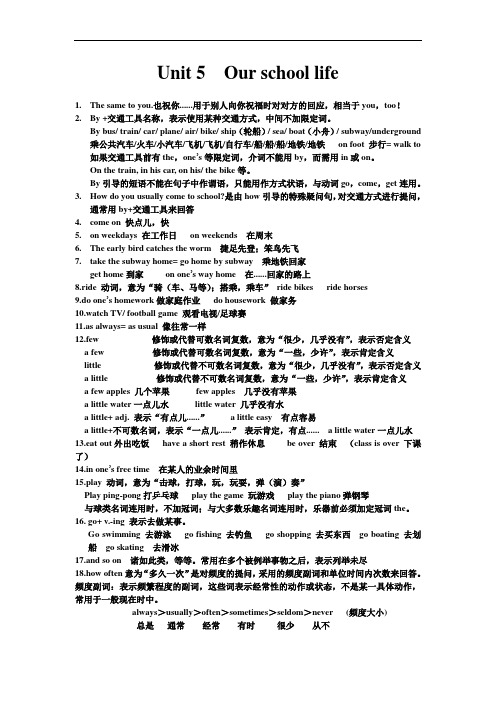
Unit 5 Our school life1.The same to you.也祝你......用于别人向你祝福时对对方的回应,相当于you,too!2.By +交通工具名称,表示使用某种交通方式,中间不加限定词。
By bus/ train/ car/ plane/ air/ bike/ ship(轮船)/ sea/ boat(小舟)/ subway/underground 乘公共汽车/火车/小汽车/飞机/飞机/自行车/船/船/船/地铁/地铁on foot 步行= walk to 如果交通工具前有the,one’s等限定词,介词不能用by,而需用in或on。
On the train, in his car, on his/ the bike等。
By引导的短语不能在句子中作谓语,只能用作方式状语,与动词go,come,get连用。
3.How do you usually come to school?是由how引导的特殊疑问句,对交通方式进行提问,通常用by+交通工具来回答e on 快点儿,快5.on weekdays 在工作日on weekends 在周末6.The early bird catches the worm 捷足先登;笨鸟先飞7.take the subway home= go home by subway 乘地铁回家get home到家on one’s way home 在......回家的路上8.ride 动词,意为“骑(车、马等);搭乘,乘车”ride bikes ride horses9.do one’s homework做家庭作业do housework 做家务10.watch TV/ football game 观看电视/足球赛11.as always= as usual 像往常一样12.few 修饰或代替可数名词复数,意为“很少,几乎没有”,表示否定含义a few 修饰或代替可数名词复数,意为“一些,少许”,表示肯定含义little 修饰或代替不可数名词复数,意为“很少,几乎没有”,表示否定含义a little 修饰或代替不可数名词复数,意为“一些,少许”,表示肯定含义a few apples 几个苹果few apples 几乎没有苹果a little water一点儿水little water 几乎没有水a little+ adj. 表示“有点儿......” a little easy 有点容易a little+不可数名词,表示“一点儿......”表示肯定,有点...... a little water一点儿水13.eat out外出吃饭have a short rest 稍作休息be over 结束(class is over 下课了)14.in one’s free time 在某人的业余时间里15.play 动词,意为“击球,打球,玩,玩耍,弹(演)奏”Play ping-pong打乒乓球play the game 玩游戏play the piano弹钢琴与球类名词连用时,不加冠词;与大多数乐趣名词连用时,乐器前必须加定冠词the。
仁爱英语七年级上册知识点归纳完整版
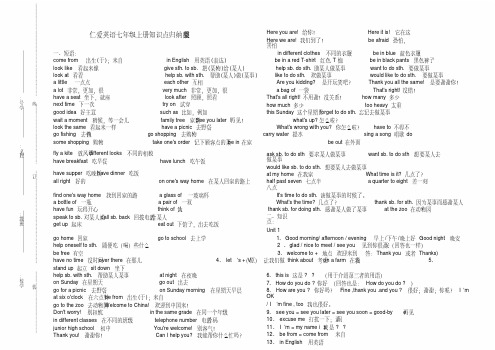
仁爱英语七年级上册知识点归纳完整版Here you are! 给你!Here it is! 它在这Here we are! 我们到了!be afraid 恐怕,害怕一、短语:in different clothes 不同的衣服be in blue 蓝色衣服come from 出生(于);来自in English 用英语(表达) be in a red T-shirt 红色 T 恤be in black pants 黑色裤子look like 看起来像give sth. to sb. 把(某物)给(某人) help sb. do sth.助某人做某事want to do sth. 要做某事look at 看着help sb. with sth. 帮助(某人)做(某事) like to do sth. 欢做某事would like to do sth. 要做某事a little 一点点each other 互相Are you kidding? 是开玩笑吧?Thank you all the same! 是要谢谢你!a lot 非常,更加,很very much 非常,更加,很 a bag of一袋That's right!没错!:号学线have a seat坐下,就座look after 照顾,照看next time 下一次try on 试穿good idea 好主意such as 比如,例如That's all right!不用谢!没关系!how many多少how much多少too heavy太重this Sunday这个星期日forget to do sth.忘记去做某事wait a moment 稍候,等一会儿family tree 家谱S ee you later再!见!what's up?怎么啦?look the same 看起来一样have a picnic 去野餐What's wrong with you?你怎么啦?have to不得不go fishing 去钓鱼go shopping 去购物carry water提水sing a song唱歌 do some shopping购物take one's order记下顾客点的菜be in 在家be out在外面:名姓fly a kite 放风筝different looks 不同的相貌have breakfast吃早餐have lunch 吃午饭ask sb. to do sth要. 求某人做某事want sb. to do sth想.要某人去做某事would like sb. to do sth.想要某人去做某事订have supper吃晚饭have dinner 吃饭all right 好的on one's way home 在某人回家的路上at my home在我家What time is it?几点了?half past seven七点半 a quarter to eight差一刻八点find one's way home 找到回家的路 a glass of 一玻璃杯It's time to do sth.该做某事的时候了。
仁爱版七年级英语下册知识点总结(全册)
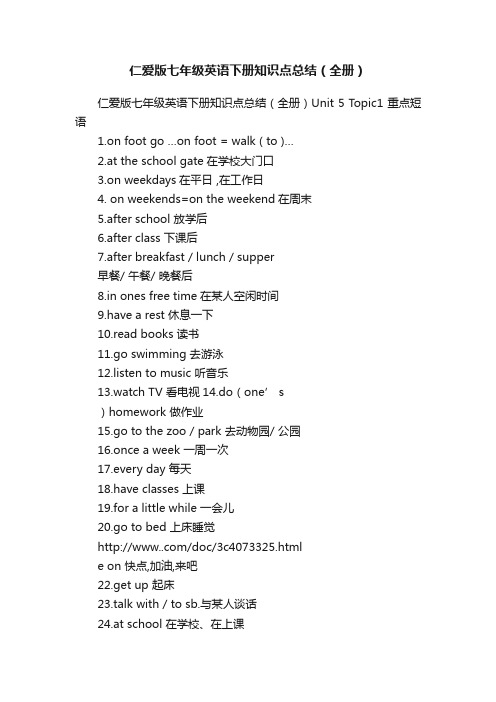
仁爱版七年级英语下册知识点总结(全册)仁爱版七年级英语下册知识点总结(全册)Unit 5 Topic1 重点短语1.on foot go …on foot = walk ( to )…2.at the school gate在学校大门口3.on weekdays在平日 ,在工作日4. on weekends=on the weekend在周末5.after school 放学后6.after class 下课后7.after breakfast / lunch / supper早餐/ 午餐/ 晚餐后8.in ones free time在某人空闲时间9.have a rest 休息一下10.read books 读书11.go swimming 去游泳12.listen to music 听音乐13.watch TV 看电视14.do(one’s)homework 做作业15.go to the zoo / park 去动物园/ 公园16.once a week 一周一次17.every day 每天18.have classes 上课19.for a little while 一会儿20.go to bed 上床睡觉/doc/3c4073325.htmle on 快点,加油,来吧22.get up 起床23.talk with / to sb.与某人谈话24.at school 在学校、在上课25.go to school 去上学26.and so on ……等等重点句型1.Happy New Year! The same to you.2.Your new bike looks very nice. Thank you.2.How do you usually come to school? —I usually come to school by subway.3.How often do you go to the library? —Once/Twice/Three times a week/Very often/Every day/Sedom4.The early bird catches the work. (谚语) 笨鸟先飞5.Classes begin at eight. =Class begins at eight. What time does the class begin? / What time do theclasses begin?6.We have no more time. 我们没有更多的时间了。
仁爱版七年级英语单词词汇表(全)

仁爱版七年级英语单词词汇表Unit 1Topic 1 Welcome to China!good adj. 好的,良好的morning n. 早晨;上午welcome interj.欢迎n.&v. 欢迎adj. 受欢迎的to prep. 到,对,向;给;在……之前动词不定式符号,无词义。
例如:to findChina n. 中国thank v. 谢谢,感谢,谢意n. (只用复数)谢谢,感谢,谢意you pron.你;你们hello interj. 喂;你好(表示打招呼、问候或唤起注意)I pron.我am v.(be动词,单数形式,主语是I时用)是I’m(缩写形式) = I am我是are v.(be动词,复数形式)是yes adv.是,好,同意;什么(用于表示疑问、征询等,常读“升调”);是吗no adv.不;不是adj. 没有,无not adv.不;没oh interj.哦;啊nice adj.令人愉快的;好的,漂亮的meet v.相识,结识;遇见,见到too adv.也,还;又;太,过分;很,非常hi interj.喂;你好(表示打招呼、问候或唤起注意)Miss n.(用于对女教师的称呼);女士;小姐(对未婚女性的称呼)this pron.&adj.这;这个is v.(be动词,单数形式,第三人称单数现在式)是Mr.(缩写形式) = mister n.先生(用于男子姓氏或姓名前)see v.看见,看到;明白,领会;拜会my pron.我的(形容词性物主代词)mom n.妈妈teacher n.老师,教师,教员how adv.怎样,如何;多少;多么do aux.(助动词)构成否定句、疑问句的助动词,无词义v.做;干;行动afternoon n.下午;午后fine adj.(身体)健康的;美好的;晴朗的goodbye interj.再见,再会bye interj. 再见evening n.傍晚,晚上and conj.和;又;而OK adj.&adv.(口语)好,对,不错later adv.以后;后来adj. 晚些的,迟些的Topic 2 Where are you from ?excuse v.原谅;宽恕me pron.我(宾格)excuse me劳驾,请原谅(尤其是引起陌生人的注意)what pron.什么;怎么样your pron.你的;你们的(形容词性物主代词)name n.名字,姓名,名称where adv.在哪里;往哪里from prep.来自;从;从……起be from来自Canada n. 加拿大the art.(定冠词)这(那)个;这(那)些the U.S.A. = the United States of America n. 美国;美利坚合众国she pron.她he pron.他isn’t(缩写形式) = is notJapan n.日本we pron.我们England n. 英格兰who pron.谁they pron.他/她/它们;人们aren’t(缩写形式) = are notthen adv.那么(通常用于句首或句尾);那时;当时;然后Cuba n. 古巴zero num.&n.零one num.一pron.(用来代替单数的人或物)一(个,只……)two num.二three num.三four num.四five num.五six num.六seven num.七eight num.八nine num.九ten num.十telephone n.电话(机)v. 打电话number n.号码;数,数字;数量it pron.它Topic 3 What class are you in ?eleven num.十一twelve num.十二thirteen num. 十三fourteen num.十四fifteen num.十五sixteen num. 十六seventeen num.十七eighteen num.十八nineteen num.十九twenty num.二十year n.年old adj.……岁的;老的;旧的year(s) old……岁How old…?……多少岁?class n.班级;课;同一个班的学生in prep.在……里(内;上);用……prep.穿着,戴着adv.在家;在内,向内grade n. 年级age n.年龄;时代that pron.& adj.那;那个English n.英语adj. 英国的;英国人的;英语的in English用英语(表达)an(不定冠词,后接以元音开头的名词) art.一(个;件……)eraser(rubber)n. 橡皮擦;黑板擦a(不定冠词,后接以辅音开头的名词)art.一(个;件……)map n. 地图spell v. 拼写can v.(情态动词)可能;能够;可以please interj.请v. 使人高兴,使人满意pencil n.铅笔double adj.双的;两倍的n. 两个;双toy n.玩具;玩物wow interj. 呀;哇(表示赞叹或惊奇)desk n.书桌,写字台p en n. 钢笔,笔ruler n. 尺子,直尺book n. 书;本子car n. 小汽车,轿车orange n.橘子,橙子;橘汁;橘色adj. 橙色的,橘色的egg n.蛋;卵blackboard n.黑板these pron.& adj. 这些those pron.& adj.那些schoolbag n.书包cake n.蛋糕;糕点;饼bus n.公共汽车box n.盒子;箱子now adv.现在school n.学校Beijing Ren’ai International School北京仁爱国际学校her pron. 她的(形容词性物主代词)pron.她(宾格)v. 打电话his pron. 他的(形容词性物主代词)pron.他的(名词性物主代词)same adj.同样的,同一的n. 同样的事but conj.但是,可是friend n.朋友ID number 身份证号码junior adj. 初级的;年少的high adj.高的;高度的junior high school初中(美国等国家12至14岁的孩子上的学校)Unit 2Topic 1 I have a small nose . guess v.猜have v.有;吃,喝has v.有(have的第三人称单数现在式)small adj.小的;少的nose n.鼻子big adj.大的eye n.眼睛know v. 知道;了解,认识;懂得right adj.对的,正确的;右边的n. 右边;权利head n.头;头脑(像);才智;首脑face n.脸v.面向,面对hair n.头发ear n.耳朵mouth [复数形式(pl.):mouths]n. 嘴neck n. 颈,脖子round adj.圆的;球形的long adj.长的;远的wide adj.宽的,宽阔的girl n.女孩boy n.男孩short adj.短的;矮的favorite adj.最喜爱的n.特别喜欢的人(或物)movie n.(尤美)电影star n. 明星;星星,恒星Chinese adj.中国的;中国人的;汉语的n. 汉语;中国人does v.(动词do的第三人称单数现在式)doesn’t = does notagain adv.再,又,再一次look v.看,瞧;观看;看起来n.(pl.)相貌;样子arm n.胳膊;臂;支架hand n.手v.递,给;交付,交上leg n. 腿;腿脚;支柱foot[复数形式(pl.):feet] n. 脚,足;英尺come v. 来,来到come from出生(于);来自student n.学生sister n.姐;妹different adj.不同的,有差异的knife[复数形式(pl.):knives] n.小刀;匕首;刀片don’t(缩写形式) = do notTopic 2 What does she look like ?both pron.两者,双方black adj.黑色的n.黑色blond adj.金黄色的;浅色的blue adj.蓝色的n.蓝色color(也写作:colour)n.颜色v.给……着色,涂色pink n.粉色adj. 粉红色的red adj.红色的n.红色purple adj.紫色的n.紫色brown adj.棕色的;褐色的n.棕色;褐色white adj.白色的n.白色gray adj.灰色的,灰白色的n.灰色green adj.绿色的,青的n.绿色yellow adj.黄色的n.黄色here adv.在这里;这里;向这里give v. 给;递给;付出;给予give…to…把……给……letter n.信;字母sorry adj.对不起,抱歉;难过的like prep.像;跟……一样n. 喜欢,喜爱look like 看起来像tall adj. 高的will v.(情态动词)将,会(表示将来);愿意,要I’ll(缩写形式) = I will我会young adj.年轻的man[复数形式(pl.):men] n.成年男人;人;人类woman[复数形式(pl.):women] n.妇女;女人snowman[复数形式(pl.):snowmen] n.雪人T-shirt n. T恤(衫)shoe n.鞋cap n.(无檐的或仅在前面有檐的)帽子coat n.外套,大衣;涂层skirt n. (女式)短裙pants(也作trousers)(只有复数形式)n.(pl.)长裤;连衣裙dress n.女服;连衣裙v. 穿衣,穿着at prep.在;在(几点钟);在(某处)look at看着photo n.照片strong adj.强壮的;坚固的;影响力大的cool adj.酷;凉爽的,凉的Topic 3 Whose jacket is this ?mine(名词性物主代词)pron.我的whose pron.谁的bike n.自行车cat n.猫hers(名词性物主代词)pron.她的our(形容词性物主代词)pron.我们的ours(名词性物主代词)pron.我们的banana n.香蕉their(形容词性物主代词)pron.他/她/它们的theirs(名词性物主代词)pron.他/她/它们的yours(名词性物主代词)pron.你的;你们的baby n. 婴儿;幼畜bag n.书包;提袋;袋子shirt n.衬衫(尤指男式)jacket n.夹克衫,短上衣think v.想,认为;考虑new adj.新的;新鲜的classmate n.同班同学clothes n.(复数pl.)衣服find v.找到;发现;感到help v.帮助,帮忙n.帮助,帮忙us(宾格)pron.我们him(宾格)pron. 他Unit 3Topic 1 Do you like English ?could v.(情态动词)(表示许可或请求)可以……;行(can的过去式),可以tell v.告诉;讲述;吩咐sure adv.当然,(口语)的确,一定adj.确信的,肯定的pen pal = penfriend n.笔友speak v.讲,说;谈话;发言some adj.一些,若干;有些;某一pron.若干,一些poor adj.不好的,差的;贫穷的;可怜的with prep.关于;有;带有;和;以;用help sb. with sth.帮助某人做某事problem n.问题,难题pet n.宠物often adv. 经常,常常want v.想,想要;需要live v.居住;生活;活着say v.说,讲visit v.参观;访问;拜访n.参观;访问;拜访great adj.伟大的;好极了;美妙的wall n.墙the Great Wall长城many adj.许多的pron.许多人(或物)lot n.许多,好些a lot很,非常;许多all pron.所有;全部,全体;一切not … at all(注意:not与at all是分开的)一点也不,根本不so conj.因此,所以adv.如此,这么;非常;同样study v.学习;研究n.书房each other互相,彼此little adv. 一点儿;稍许adj. 小的a little 一点点them(宾格)pron. 他/她/它们very adv.非常,很much adv.非常,更加,很very much非常,很home n.家adv.到家;回家at home在家its(形容词性物主代词)pron. 它的(名词性物主代词)pron.它的dog n.狗any adj.(用于否定句、疑问句等)一些;什么;任何的pron.(无论)哪一个,哪些of prep.(表示所属、数量、其中)……的Topic 2 What does your mother do ?kid n.(口语)小孩子v.开玩笑glad adj.高兴的;乐意的seat n.座位,座have a seat 就座,坐下mother n.母亲father n.父亲doctor n.医生,大夫;博士parent n.父亲(或母亲)office n.办公室worker n.工人;工作者driver n.司机,驾驶员farmer n.农民cook n.炊事员,厨师v.烹调,煮,烧;做饭nurse n.护士;保育员work v. 工作;(机器、器官等)运转n.工作,劳动hospital n.医院on prep.在……上;关于farm n. 农场;农庄on a farm在农场drive v.驾驶,开(车);驱赶family n.家庭(包括父母和子女);家族aunt n.婶母;伯母;姨母;舅母;姑母uncle n.叔;伯;舅;姨父;姑父brother n.兄,弟sofa n.长沙发grandparent n.祖父(母);外祖父(母)cousin n.堂(表)姐妹;堂(表)兄弟daughter n.女儿tree n.树family tree家谱son n.儿子happy adj.快乐的,幸福的;高兴的teach v.教书,教only adv.仅仅,只有cute adj.逗人喜爱的;机灵的;有吸引力的after prep. 在……之后;在……后面conj.在……以后look after照看,照顾Topic 3 What would you like to drink ?yourself[复数形式(pl.):yourselves] pron.你自己help oneself(to)请随便吃点/喝点(……)would v.(情态动词)打算,想要;(will的过去式)将会fish n.鱼肉;鱼v.钓鱼;捕鱼chicken n.鸡肉;鸡about prep.关于,对于adv.大约;到处,四处What about…?……怎么样?……好不好?rice n.米饭;稻米all right行了,好吧drink v.喝n.饮料juice n.果汁;果汁饮料milk n.牛奶for prep.对……来说;为了;向……,往……;适合……;因为……;对于……idea n.主意,想法,意见good idea好主意water n.水vegetable n.蔬菜bread n.面包hamburger n.汉堡包usually adv.通常地,一般地breakfast n.早餐,早饭lunch n.午餐,午饭supper n.晚餐,晚饭;夜宵food n.食物,食品may v.(情态动词)可以;也许,可能take v.拿;拿走;乘坐;花费;服用;携带order n.菜单;订货单;顺序v.订购;点菜take one’s order记下顾客点的饭菜sir n.先生something pron.某事(物);某东西glass n.(玻璃)杯a glass of一杯wait v.等,等候moment n.片刻;瞬间wait a moment等一会儿let v.让well interj.嗯;好吧,那么;哎呀adj.好的;健康的adv.好;令人满意eat v.吃out adv.不在里面,在(到)外面eat out下馆子,出去吃饭dinner n.正餐,宴会have dinner吃饭why adv.为什么Why not…?(提出建议)为什么不……?Here you are . 给你。
仁爱版七年级上册语法知识点总结

仁爱版七年级上册语法知识点总结一、一般现在时。
1. 概念。
- 表示经常发生的动作或存在的状态。
例如:I often get up at six o'clock.(我经常在六点起床。
)- 表示客观事实或普遍真理。
例如:The earth goes around the sun.(地球绕着太阳转。
)2. 句子结构。
- 肯定句:- 主语 + be动词(am/is/are)+ 其他。
例如:He is a student.(他是一名学生。
)- 主语(非第三人称单数)+ 动词原形+ 其他。
例如:They play football every day.(他们每天踢足球。
)- 主语(第三人称单数)+ 动词第三人称单数形式+ 其他。
例如:She likes reading books.(她喜欢读书。
)- 否定句:- 主语 + be动词(am/is/are)+ not+ 其他。
例如:I am not a teacher.(我不是一名教师。
)- 主语(非第三人称单数)+ don't+ 动词原形+ 其他。
例如:They don't like apples.(他们不喜欢苹果。
)- 主语(第三人称单数)+ doesn't+ 动词原形+ 其他。
例如:He doesn't go to school on Sunday.(他星期天不去上学。
)- 一般疑问句:- Be动词(am/is/are)+ 主语 + 其他?例如:Are you a doctor?(你是一名医生吗?)- (非第三人称单数)Do+ 主语+ 动词原形+ 其他?例如:Do they play basketball?(他们打篮球吗?)- (第三人称单数)Does+ 主语+ 动词原形+ 其他?例如:Does she have a pen?(她有一支笔吗?)二、名词的单复数。
1. 规则变化。
- 一般情况加 -s。
例如:book - books,pen - pens。
- 1、下载文档前请自行甄别文档内容的完整性,平台不提供额外的编辑、内容补充、找答案等附加服务。
- 2、"仅部分预览"的文档,不可在线预览部分如存在完整性等问题,可反馈申请退款(可完整预览的文档不适用该条件!)。
- 3、如文档侵犯您的权益,请联系客服反馈,我们会尽快为您处理(人工客服工作时间:9:00-18:30)。
七年级上册Unit 1 Making New FriendsTopic 1 Welcome to China!重点:1. 字母(1)26个英语字母的大小写形式(2)5个元音字母:Aa Ee Ii Oo Uu2. 交际英语(1)—Good morning! —Good afternoon!—Good evening!—Good night!—Good morning! —Good afternoon!—Good evening!—Good night!早上好!下午好!晚上好!晚安!(2)Thank you.=Thanks.谢谢。
(3)—Hello/Hi!—Hello/Hi!你好!(4)—How do you do ?—How do you do ?你好!(初次见面)(5)—How are you ? 你好!—I`m fine(OK),thank you (thanks).我很好,谢谢!(6)—Nice to meet /see you.见到你很高兴。
—Nice to meet/see you,too。
见到你也很高兴。
(7)—See you later.再见。
—Good bye.再见。
—See you. —Good bye./Bye-bye.?/Bye.3. 短语(1)welcome to 欢迎到…..4. 句型(1)—I am Kangkang.Are you Michael?我是康康。
你是迈克尔吗?—Yes,I am.是的,我是。
/No,I`m not.不,我不是。
(2)This is Michael. 这是迈克尔。
This is Miss Wang. 这是王老师。
This is +人/物用来给对方介绍人或者物等。
5. 语法Be动词I用am, You用are,is跟着他她它;单数用is,复数就用are;变疑问,提前它;变否定,更容易,be后not加上去;疑问否定任你变,句首大写莫忘记,句末问号莫忘记。
Topic 2 Where are you from?重点:1. 短语(1)Excuse me 打扰了(请问、劳驾)常常用于句首(2)telephone number 电话号码(3)be from 来自=come from2. 句型(1)What`s your name?你叫什么名字?My name is …. / I am….. 我叫….。
(2)Where are/is you/she(he) from? 你/她(他)来自哪里?I`m /She(h e) is from ….我/她(他)来自……。
(3)Who is she/he?她/他是谁?She/He is ….. 她/他是….。
(4)Who are they?他们是谁?They are ……他们是….。
(5)What`s your telephone number?你的电话是多少?My telephone number is …..我的电话号码是….3. 0~10数字的读写说听4. 语法主格人称代词(I, we, you, you, he, she, they)要分清第一人称,第二人称以及第三人称的单复数人称代词的主格形式。
5. 掌握缩写词(如isn’t =is not aren’t=are not he’s=he is what’t=what is …)Topic 3 What class are you in ?重点:1. 短语(1)year(s) old ….岁(2)in English 用英语(注意:用什么语言是用的in +语言)(3)phone number=telephone number 电话号码(4)in the same class 在同一个班级里(5)good friend 好朋友(6)junior high school 初中(7)senior high school 高中(8)school things 学习用具2. 句型(1)How old are you ?你多大了?I`m …. (years old). 我….岁。
(2)What class are you in ?你在哪个班?I`m in Class … 我在…班。
(3)What grade are you in?你在几年级?I`m in Grade …. 我在…年级。
注意:如果说要一句话表达完整说“我在几年级几班。
”就应该这样表达:I`m in Class…,Grade ….特别注意回答时class,grade和后面的数字单词的首字母都要大写。
(4)Who`s this?这是谁?Who`s that?那是谁?What`s this?这是什么?What`s that?那是什么?This is ….这是….。
That is ….那是….。
注意:this 近指that远指两者都表示单数(5)What`s this/that in English? 这个/那个用英语怎么说?This/That is …… 这是/那是…..(6)How do you spell it ?你怎么拼写它?e.g.E-R-A-S-E-R,eraser.(7)Can you spell it,please?你会拼写它吗?Yes.E-R-A-S-E-R,eraser.注意:两句的回答有所不同。
Can情态动词,引导一般疑问句,肯定回答Yes,I can. 否定回答:No,I can`t.(8)Thank you./Thanks.谢谢。
You`re welcome./That`OK.不客气。
/不用谢。
(9)Is this/that…..? 这/那是什么吗?Yes,it is.是的,它是。
/No,it isn`t.不,它不是。
(10)What are these/those?这些/那些是什么?These/Those are…..这些/那些是…。
(11)Are these/those …..?这些/那些是….吗?Yes,they are.是的,他/她/它们是。
No,they aren`t. 不,他/她/它们不是的。
these/those 都表示复数(12) They are not in the same class,but they are good friends.他们不在同一个班,但他们是好朋友。
注意:same前面通常加the;but是并列连词,表示转折关系,可连接两个词、短语和句子。
3. 11~20数字的读写说听4. 语法(1)冠词冠词分为不定冠词(a/an)和定冠词(the)。
本单元学习不定冠词a/an的用法a: 用于辅音音素开头的单词前an:用于元音音素开头的单词前(2)名词的单复数表示人或事物的的名称的词叫名词。
根据事物的性质可分为可数名词和不可数名词。
以下为可数名词复数的变化规则:1) 规则变化A. 直接加—s, 如:book—books ruler—rulersB. 以s,x,sh,ch等结尾的词加—es,如:bus—buses box—boxesC. 以辅音字母加y结尾的词,变y为i加es。
如:baby—babies family—familiescountry—countriesD.以f或fe结尾的词,大多数是变f或fe为ves。
如:wife—wivesknife—knives leaf—leavesE. 以O结尾的词多数加—s,如:radio—radios zoo—zoos只有少数的加—es, 如:potato—potatoes tomato—tomatoesNegro-Negroes hero-heroes(两菜两人)2) 不规则变化A. man—men woman—women foot—feet child—children等等B. 单复数一样sheep—sheep deer—deer fish—fish Chinese—Chinese等等Unit 2 Looking DifferentTopic 1 I have a small nose重点:1、短语:(1)I know = I see 我明白了(2)That’s right那是对的(3)look the same look like 看起来相像look different 看起来不同例:Jim and Lilei look the same.== Jim looks like Lilei.(4)look at + n 看某物look for +n 寻找某人/某物look after +n 照顾某人(5)both 两者都…… all 三者或者三者以上都……Both 和all位于be动词或情态动词后,位于行为动词前。
例:We are both students. We both have black eyes. We can both speak English.(6)give sth to sb = give sb sth 把某物给某人;(注意:如果sth是it或them,只能用前者)(7)have different looks == look different 有着不同的长相(看起来不相像) have the same look. ==look the same 有着相同的长相(看起来很相像)(8)over there 在那边come in 请进go out 出去(9)in + 颜色或in a/an/the +颜色+ 衣服表示穿着……颜色的衣服常常接在名词的后面,表示穿……颜色衣服的…… 如the girl in red is my sister. (10)too + adj 太……(11)pants 和shoes 做主语,谓语动词用复数;但a pair of pants/ shoes作主语时,谓语动词用单数形式例:His shoes are black. A pair of shoes is under the bed.(12)in the morning/ afternoom/ evening 在早上/下午/晚上at night 在晚上(13)go shopping = go to the shop 去购物类似的有go swimming go fishing go skating 等等(14)help sb. ( to ) do sth == help sb with sth 帮助某人做某事注意:sb 用代词时必须用宾格(15)high school 中学(16)play +球类play the 乐器(17)think of 认为,想think about 考虑I think + 从句我认为……I think you are right. 否定式常否定主句,但翻译时要否定后面的从句例:I don’t think he can come. 我认为他不会来了.(不能说:我不认为他会来)2、句型:(1)What do/does + 主语+ look like ? 询问人的长相例:What does your English teacher look like ?(2)What’s -----and ------? ……加……是什么?(回答:It’s ------)例:What’s red and yellow? It’s orange.What’s two and five? It’s seven.(3)Whose + 东西+ is this/ that ? Whose + 东西+are these/ those ?这/这些是谁的……?例:Whose coat is this ? It is mine.Whose shoes are these ? They are hers.(4)Who is the letter from? 这封信来自于谁?It’s from Lily. 它来自于莉莉。
